White House, in gamble, demands make-or-break health vote
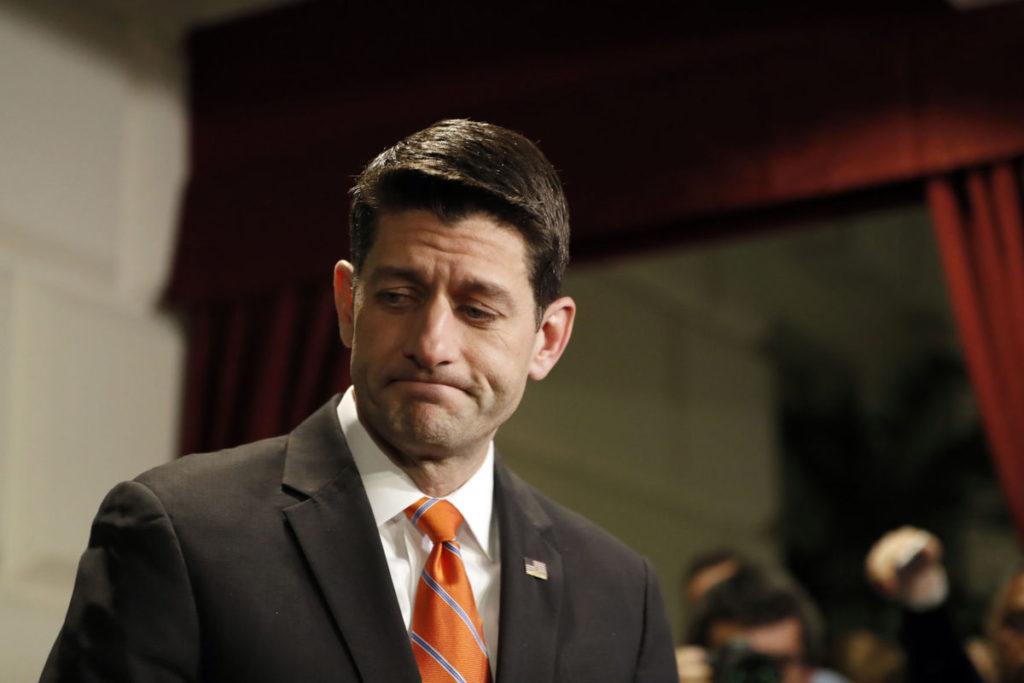
Abandoning negotiations, President Donald Trump demanded a make-or-break vote on health care legislation in the House, threatening to leave “Obamacare” in place and move on to other issues if Friday’s vote fails. The risky move, part gamble and part threat, was presented to GOP lawmakers behind closed doors Thursday night after a long and intense day that saw a planned vote on the health care bill scrapped as the legislation remained short of votes amid cascading negotiations among conservative lawmakers, moderates and others. At the end of it the president had had enough and was ready to vote and move on, whatever the result, Trump’s budget director Mick Mulvaney told lawmakers. “‘Negotiations are over, we’d like to vote tomorrow and let’s get this done for the American people.’ That was it,” Rep. Duncan Hunter of California said as he left the meeting, summarizing Mulvaney’s message to lawmakers. “Let’s vote,” White House chief strategist Steve Bannon said as he walked out. “For seven and a half years we have been promising the American people that we will repeal and replace this broken law because it’s collapsing and it’s failing families, and tomorrow we’re proceeding,” House Speaker Paul Ryan said, then walked off without answering as reporters demanded to know whether the bill had the votes to pass. The outcome of Friday’s vote was impossible to predict. Both conservative and moderate lawmakers had claimed the bill lacked votes after a long day of talks. But the White House appeared ready to gamble that the prospect of failing to repeal former President Barack Obama‘s health law, after seven years of promising to do exactly that, would force lawmakers into the “yes” column. “It’s done tomorrow. Or ‘Obamacare’ stays,” said Rep. Chris Collins, R-N.Y., a top Trump ally in the House. Collins was among those predicting success Friday, but others didn’t hide their anxiety about the outcome. Asked whether Republicans would be unified on Friday’s vote, freshman Rep Matt Gaetz of Florida said, “I sure hope so, or we’ll have the opportunity to watch a unified Democratic caucus impeach Donald Trump in two years when we lose the majority.” Thursday’s maneuvers added up to high drama on Capitol Hill, but Friday promised even more suspense with the prospect of leadership putting a major bill on the floor uncertain about whether it would pass or fail. The Republican legislation would halt Obama’s tax penalties against people who don’t buy coverage and cut the federal-state Medicaid program for low earners, which the Obama statute had expanded. It would provide tax credits to help people pay medical bills, though generally skimpier than Obama’s statute provides. It also would allow insurers to charge older Americans more and repeal tax boosts the law imposed on high-income people and health industry companies. The measure would also block federal payments to Planned Parenthood for a year, another stumbling block for GOP moderates. In a concession to the conservative House Freedom Caucus, many of whose members have withheld support, the legislation would repeal requirements for insurers to cover “essential health benefits” such as maternity care and substance abuse treatment. The drama unfolded seven years to the day after Obama signed his landmark law, an anniversary GOP leaders meant to celebrate with a vote to undo the divisive legislation. “Obamacare” gave birth to the tea party movement and helped Republicans win and keep control of Congress and then take the White House. Instead, as GOP leaders were forced to delay the vote Thursday, C-SPAN filled up the time playing footage of Obama signing the Affordable Care Act. “In the final analysis, this bill falls short,” GOP Rep. Jaime Herrera Beutler of Washington state said in a statement Thursday as she became the latest rank-and-file Republican, normally loyal to leadership, to declare her opposition. “The difficulties this bill would create for millions of children were left unaddressed,” she said, citing the unraveling of Medicaid. In a danger sign for Republicans, a Quinnipiac University poll found that people disapprove of the GOP legislation by 56 percent to 17 percent, with 26 percent undecided. Trump’s handling of health care was viewed unfavorably by 6 in 10. House Minority Leader Nancy Pelosi, D-Calif., who as speaker was Obama’s crucial lieutenant in passing the Democratic bill in the first place, couldn’t resist a dig at the GOP disarray. “You may be a great negotiator,” she said of Trump. “Rookie’s error for bringing this up on a day when clearly you’re not ready.” Obama declared in a statement that “America is stronger” because of the current law and said Democrats must make sure “any changes will make our health care system better, not worse for hardworking Americans.” Trump tweeted to supporters, “Go with our plan! Call your Rep & let them know.” Unlike Obama and Pelosi when they passed Obamacare, the Republicans had failed to build an outside constituency or coalition to support their bill. Instead, medical professionals, doctors and hospitals — major employers in some districts — as well as the AARP and other influential consumer groups were nearly unanimously opposed. So were outside conservative groups who argued the bill didn’t go far enough. The Chamber of Commerce was in favor. Moderates were given pause by projections of 24 million Americans losing coverage in a decade and higher out-of-pocket costs for many low-income and older people, as predicted by the nonpartisan Congressional Budget Office. In an updated analysis Thursday, the CBO said late changes to the bill meant to win over reluctant lawmakers would cut beneficial deficit reduction in half, while failing to cover more people. And, House members were mindful that the bill, even if passed by the House, faces a tough climb in the Senate. Republished with permission of The Associated Press.
Alabama embraces auto industry jobs at high safety cost, report says

Alabama’s embrace of the auto industry has brought in thousands of jobs for the state, though it has come at the price of safety according to a long-form piece by Peter Waldman of Bloomberg. The article combs through thousands of pages of records from the Occupational Safety and Health Administration that show dozens of preventable accidents that have left many Alabamian autoworkers without fingers, limbs and sometimes their lives. “Employees work ungodly hours, six or seven days a week, for months on end. Pay is low, turnover is high, training is scant and safety is an afterthought, usually after someone is badly hurt,” Waldman writes. “Many of the same woes that typify work conditions at contract manufacturers across Asia now bedevil parts plants in the South.” According to the OSHA records, the chances of losing a finger or limb at an Alabama parts factory in 2015 was double the rate for the American auto industry as a whole. “The pressure inside parts plants is wreaking a different American carnage than the one Trump conjured up at his inauguration. OSHA records obtained by Bloomberg document burning flesh, crushed limbs, dismembered body parts, and a flailing fall into a vat of acid. The files read like Upton Sinclair, or even Dickens,” the article says. The article details a series of horrible accidents suffered by plant workers, most of which were due to manufacturing companies not providing proper safety training to their employees. Among the cases are the death of Regina Elsea, who was pinned to a steel dashboard by a manufacturing robot; Nathaniel Walker, who fell into a vat of acid while trying to clean a tank; and Reco Allen, a janitor who lost his left arm to a stamping machine when his supervisor illegally took him off mop duty to work on the line. Allen eventually reached a multimillion-dollar settlement with the company, Matsu, and bought a big house on 15 acres with a fish pond. “I’d rather have my arm back any day,” Allen says.
On this day in Alabama history: Wernher von Braun was born in Germany

Rocket engineer Wernher von Braun was born in Wirsitz, Germany. Credited with inventing the world’s first ballistic missile, the V-2, for Nazi Germany, von Braun secretly moved to the U.S. in 1945 and Huntsville in 1950. While at Redstone Arsenal and, later, the Marshall Space Flight Center, von Braun led the development of the Redstone family of rockets responsible for launching the first U.S. satellite into space, America’s first two manned spaceflights, and the Apollo 11 moon landing in 1969. Von Braun received the National Medal of Science in 1975 and was posthumously inducted into the U.S. Space and Rocket Center Hall of Fame in 2007. Read more at Encyclopedia of Alabama. Republished with permission of Alabama NewsCenter.
Young Women’s Empowerment Conference challenges traditional images of success

From career selection solutions to improving personal image, the 2017 Young Women’s Empowerment Conference (YWEC) was held with one main mission in mind – to elevate young women’s self-esteem in order to help them make sound decisions. The daylong event was May 18 at Alabama Power Corporate Headquarters, as the company was one of its sponsors. Nearly 100 young women, students ages 14-19, gathered to hear motivational speakers and professional counselors share success strategies and tips. They also attended several breakout sessions. The interactive meetings, in which students were encouraged to ask questions, were hosted by professionals and college students. Participating high schools in the Birmingham and surrounding areas included Clay-Chalkville, Hoover, Indian Springs, Mountain Brook, Parker and Ramsay. Students from Tuscaloosa’s Hillcrest High also attended. Conference organizers said they enjoy putting on this annual event to help girls make good choices. Some speakers challenged popular images of success, like superstar singers and actresses, and replaced those with a roadmap for personal success. “Being able to guide them along the right career or personal path is so important,” said Chiante Cleggett, executive director of YWEC.“Good decisions are key factors in achieving notable accomplishments, and bringing other women together to share how they skillfully navigated life is encouraging.” Alabama Power’s Rashada Leroy hosted the closing awards ceremony and shared why she believes the annual girl power session is so important. “It’s an incredible opportunity to inspire our young girls,” said LeRoy. “They face so many challenges to look and behave a certain way according to society. But this conference gave them keys on how to be comfortable with just being themselves.” Republished with permission of Alabama NewsCenter.
Jefferson County gets $25M for infrastructure, economic development
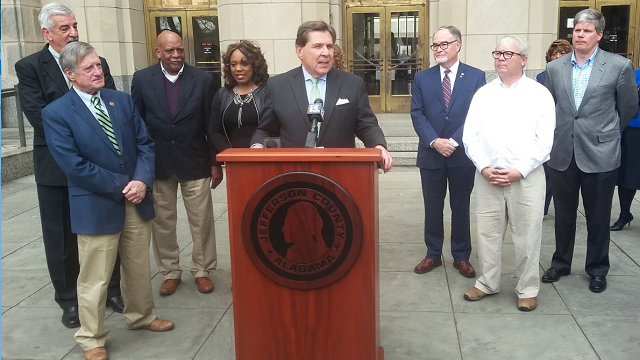
Some area leaders called it the luck of the Irish. On March 17, the Alabama Supreme Court ruled that Jefferson County can refinance nearly $600 million in school construction bonds and use $60 million in annual savings for area projects. The $60 million includes $36.3 million every year to Jefferson County, of which $25 million will go for road repairs and construction and the rest to furnish economic development incentives, according to county officials. Commission President Jimmie Stephens said the money will help with acquisition of land for industrial parks. “We must have the resources to be competitive and recruit new industry and grow jobs,” Stephens said. The money could be available during the 2018 fiscal year, which begins Oct. 1, 2017. The county is off to a strong economic start this year, with announcements that include a Publix Super Markets Alabama distribution center grand opening and global auto supplier Grupo Antolin’s plans to invest nearly $10.4 million to establish a manufacturing facility. County officials say there is potential for additional growth and revenue, after years of cutbacks, that can help the county reach its financial objectives. “Today’s Alabama Supreme Court ruling is the pathway to restoring Jefferson County’s government, albeit at a much smaller but more cost-effective footprint, without any new taxes,” County Commissioner David Carrington said. The court ruling on St. Patrick’s Day was cheered by a host of elected officials who pointed out that Democrats and Republicans supported legislation to refinance the debt. “It took teamwork to get this done,” said Stephens. “It took a collaborative effort, communication, cooperation and coordination. … I am proud of what we accomplished as a team. I am grateful to the (legislative) delegation and our commissioners.” State Sen. Rodger Smitherman, D-Birmingham; state Rep. Jack Williams, R-Vestavia Hills, and state Rep. David Faulkner, R-Homewood, were among the bipartisan group of lawmakers who joined Stephens, county commissioners and transit officials at the press conference. “This gives us a chance to show what happens when we work together,” Smitherman said. “This is a model, and I hope this model continues to move forward because there is strength in all of us working together.” The $60 million in annual savings from refinancing the debt includes $18 million each year for schools, based on enrollment. That means an estimated $6.3 million annually for Jefferson County Schools and $4.1 million annually for Birmingham City Schools. In addition to the county government and schools, Jefferson County legislators will get $3.6 million to split up in their districts for fire departments, libraries, school grants and sidewalks; the Birmingham-Jefferson County Transit Authority will get $2 million a year for 10 years; and the Birmingham Zoo will get $500,000. “Other than Dec. 3, 2013, the day the county exited Chapter 9 bankruptcy, today is a very, very good day for the citizens of Jefferson and surrounding counties,” Carrington said. This story originally appeared in The Birmingham Times.
Thursday vote on GOP health care bill canceled

GOP leaders in the U.S. House of Representatives have canceled a scheduled Thursday night vote on a plan to repeal and replace President Barack Obama‘s signature health care law, a Republican aid confirmed to Alabama Today. The decision came after conservatives in the House Freedom Caucus failed to strike a deal on the bill in a meeting with President Donald Trump Thursday at the White House. North Carolina-Republican U.S. Rep. Mark Meadows, chairman of the House Freedom Caucus, told reporters while no deal had been made today, he was still hopeful one ultimately would be. “I am very hopeful we can find a way to yes,” said Meadows of a future deal. This story will be updated.
House Freedom Caucus chairman says there’s ‘no deal’ on the GOP health care legislation after White House meeting

The Latest on the upcoming health care vote in the House (all times local): 1:35 p.m. The chairman of the conservative House Freedom Caucus says there’s “no deal” on the GOP health care legislation after a meeting at the White House with President Donald Trump. The assertion from Congressman Mark Meadows of North Carolina throws plans for a vote on the bill later Thursday into doubt. Two dozen or so Freedom Caucus members have opposed the legislation pushed by GOP leaders, saying it doesn’t go far enough to repeal “Obamacare.” But the group had been negotiating directly with the White House in hopes of reaching agreement to eliminate additional requirements on insurers. Without a deal with the Freedom Caucus, and with moderate-leaning members defecting, it seems unlikely GOP leaders will have the votes they need to go forward with a vote later Thursday as they had planned. ___ 10:06 a.m. Former President Barack Obama is celebrating the seventh anniversary of his landmark health care law, saying in a statement on Thursday that “America is stronger because of the Affordable Care Act.” Obama does not directly address GOP efforts to repeal his law, which are coming to a head Thursday as House leaders push toward a vote on their repeal legislation. Republicans remain short of votes. The former president does say that if Republicans are serious about lowering costs and expanding coverage, and are prepared to work with Democrats, “That’s something we all should welcome.” But, Obama says, “we should start from the baseline that any changes will make our health care system better, not worse for hardworking Americans.” He notes 20 million Americans gained coverage under his law. ___ 9:40 a.m. President Donald Trump is urging people to call their lawmakers to express support for the Republican legislation to repeal and replace “Obamacare.” Trump posted a video on Twitter Thursday asking people to get behind the plan. He says that people were “given many lies” about the Affordable Care Act. Trump added that the legislation was “terrific” and “you’re going to be very, very happy.” The GOP legislation was on the brink hours before Republican leaders planned to put it on the House floor for a showdown vote. Trump was spending the final hours trying to close the deal with conservatives who have opposed the plan. ___ 9:00 a.m. The GOP’s long-promised legislation to repeal and replace “Obamacare” stands on the brink, just hours before Republican leaders planned to put it on the House floor for a showdown vote. The stakes are high, and Republicans are staring at the possibility of a failure that would throw prospects for their other legislative goals into uncertainty. Speaking to members of the conservative Freedom Caucus mid-day Thursday, Trump is pitching concessions to representatives who want to limit the requirement for health plans to include benefits including substance abuse and maternity care. But those changes appear to be scaring off at least some moderate Republicans. In a count by The Associated Press, at least 26 Republicans say they opposed the bill, enough to narrowly defeat the measure. Republished with permission of The Associated Press.
What they’re saying about the American Health Care Act: Robert Bentley
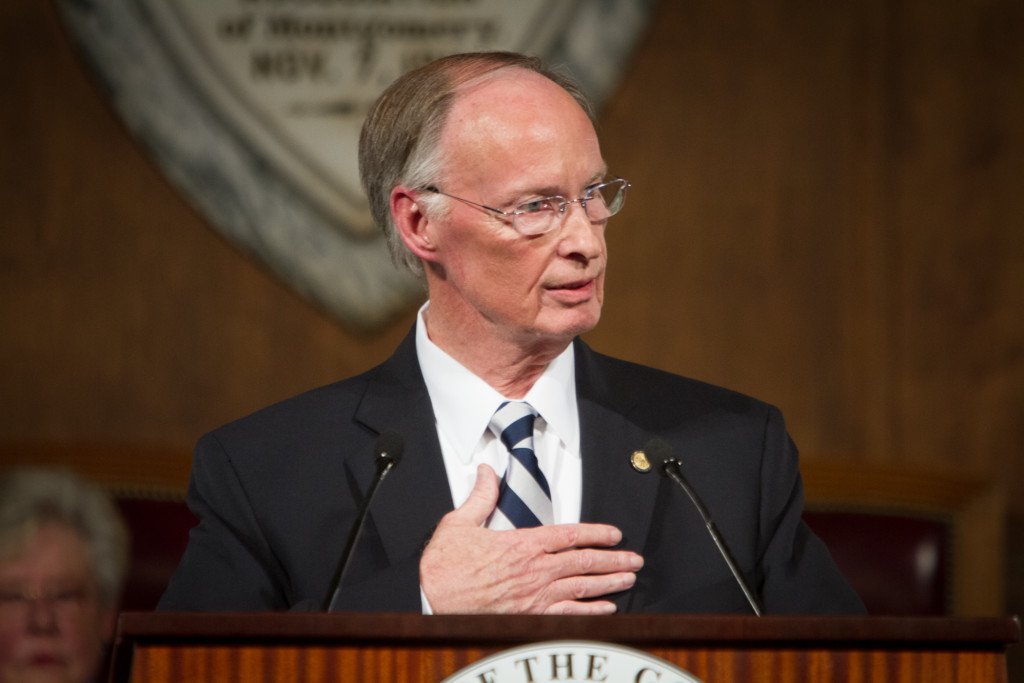
The Republican alternative to replace Obamacare will face it’s first test Thursday. The U.S. House of Representatives is expected to vote on the new American Health Care Act (AHCA) to repeal and replace the Affordable Care Act, better known as Obamacare. On Wednesday, Alabama Gov. Robert Bentley addressed a letter to President Donald Trump thanking him and his Administration for developing the plan — a three-pronged approach intended to improve health-care delivery and health insurance in our country. Bentley mentioned that he is also looking forward to working with the Trump Administration to help Alabama improve Medicaid for its citizens by providing managed care through regional care organizations. “Secretary Price on Monday, in a meeting with me and other Alabama officials, assured us that Alabama, a state that stood strong and chose not to expand Medicaid, will be given much-needed flexibility to adjust to changes proposed by the American Health Care Act,” he said in his letter to the President. Bentley wanted to make sure Alabama, and the 18 other non-expansion states, was not financially hurt in the health care overhaul. “Given such assurances, and given some key changes made in recent days to the proposed American Health Care Act, I support the legislation,” Bentley continued. Under the new proposal, Alabama would receive an additional $90 million annually for five year. Read the full letter below:
Mike Rogers: Repealing and replacing Obamacare
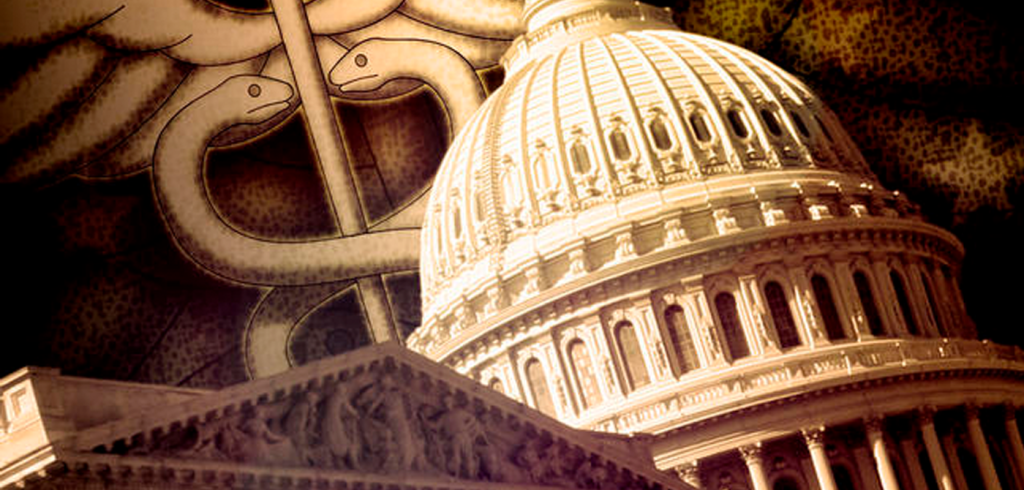
Every day, my staff and I hear horror stories from folks back home about the devastating impacts of Obamacare. Folks in the Third District have lost their insurance plans and seen their premiums and deductibles rise for the past seven years. Obamacare has also created an unworkable regulatory environment for doctors and hospitals. Small businesses are crippled by the increased regulations and taxes. It’s very simple to understand – Obamacare doesn’t work, nor will it get better. This march toward a single-payer system is unacceptable. The choice is clear – we have to repeal and replace this law. With the change in the White House, we finally have a chance to repeal and replace Obamacare. President Donald Trump and Congress are working on legislation that will result in lower premiums, increase access to quality healthcare, reduce the federal deficit, and make major entitlement reform by capping Medicaid spending. Obamacare became much more than just a law. Under President Barack Obama, Obamacare grew into a massive regulatory nightmare. Make no mistake – these regulations will take more time to undo. The Trump Administration will take the lead there with my full support. Republicans in Congress will repeal the multitude of taxes that came with Obamacare, which will provide some much-needed relief for middle-income Americans and small business owners. Further phases will continue to provide relief to Alabamians, while ensuring our values we hold dear are protected. This effort will increase choices for consumers and allow the free market to take hold of the insurance market to reduce costs, something that Obamacare aimed to do the opposite of. With President Trump’s strong leadership and Congressional action, Americans will finally experience relief from the crushing weight that is Obamacare. I will continue to fight for the healthcare freedoms folks in Alabama want and need. ••• Mike Rogers is a member of U.S. Congress representing Alabama’s 3rd Congressional District.
Israeli man arrested in Jewish center bomb-threat cases

Israeli police on Thursday arrested a 19-year-old Israeli Jewish man as the primary suspect in a string of bomb threats targeting Jewish community centers and other institutions in the U.S., marking a potential breakthrough in a case that stoked fears across the United States. Police spokesman Micky Rosenfeld described the suspect as a hacker, but said his motives were still unclear. Israeli media identified him as an American-Israeli dual citizen and said he had been found unfit for compulsory service in the Israeli military. “He’s the guy who was behind the JCC threats,” Rosenfeld said, referring to the dozens of anonymous threats phoned in to Jewish community centers in the U.S. over the past two months. The Anti-Defamation League says there have been more than 120 bomb threats against U.S. Jewish community centers and day schools in the U.S. since Jan. 9. Those threats led to evacuations of the buildings, upset Jewish communities and raised fears of rising anti-Semitism. The threats were accompanied by acts of vandalism on several Jewish cemeteries. The threats led to criticism of the White House for not speaking out fast enough. Last month, the White House denounced the threats and rejected “anti-Semitic and hateful threats in the strongest terms.” Rosenfeld said the suspect allegedly placed dozens of threatening phone calls to public venues, synagogues and community buildings in the U.S., New Zealand and Australia. He also placed a threat to Delta Airlines, causing a flight in February 2015 to make an emergency landing. Rosenfeld said the man, from the south of Israel, used advanced technologies to mask the origin of his calls and communications to synagogues, community buildings and public venues. He said police searched his house Thursday morning and discovered antennas and satellite equipment. “He didn’t use regular phone lines. He used different computer systems so he couldn’t be backtracked,” Rosenfeld said. After an intensive investigation in cooperation with FBI representatives who arrived in Israel, as well as other police organizations from various countries, technology was used to track down the suspect who had made the threats around the world, Rosenfeld said. In Washington, the FBI confirmed the arrest but had no other comment. Republished with permission of The Associated Press.
Former colleagues, judges to testify for Supreme Court pick Neil Gorsuch
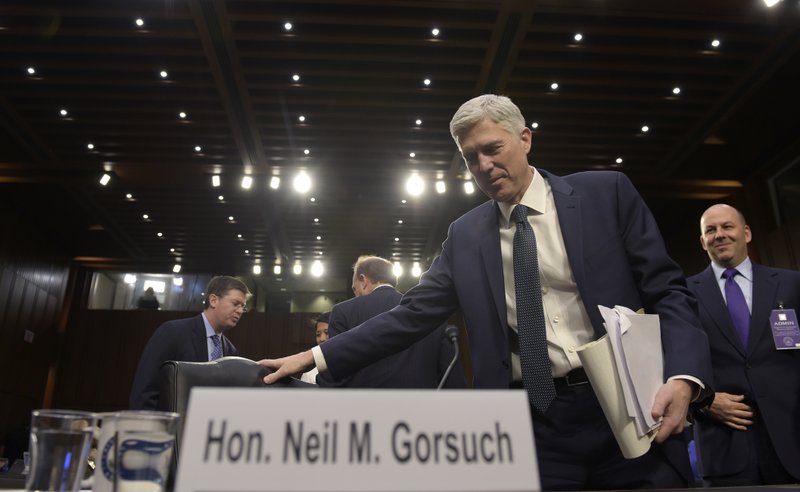
Lawyers, advocacy groups and former colleagues get their say on President Donald Trump‘s Supreme Court nominee after Judge Neil Gorsuch emerged unscathed from two days of tough questioning at his confirmation hearing. Assured of support from majority Republicans, Gorsuch received glowing GOP reviews but complaints from frustrated Democrats that he concealed his views from the American public. Gorsuch, a federal appeals court judge in Denver, refused repeated attempts to get him to talk about key legal and political issues of the day. But he did tell Sen. Dianne Feinstein, who worried that Gorsuch would vote to restrict abortion, that “no one is looking to return us to horse and buggy days.” On Thursday, the panel will hear from the American Bar Association, which has already given him a unanimous “well qualified” rating, along with former colleagues and judges supporting him and advocacy groups like the Human Rights Campaign that have opposed him. After the hearing, the Judiciary panel is expected to vote in the next two weeks to recommend Gorsuch favorably to the full Senate. Though Gorsuch is expected to eventually be confirmed, the process on the Senate floor is less assured. Some Democrats have already said they want to try and block the nomination. That means Senate Majority Leader Mitch McConnell, R-Ky., will have to round up 60 votes to proceed to a confirmation vote, including eight Democrats. It’s unclear if he will have those votes. Democrats Jeff Merkley of Oregon, Kirsten Gillibrand of New York, Sherrod Brown of Ohio, Tammy Baldwin of Wisconsin, Elizabeth Warren of Massachusetts and Ed Markey of Massachusetts have declared their opposition. Most Democrats have said they will decide when the hearings are over. Sen. Bob Casey, a Democrat up for re-election in Pennsylvania next year, said he will announce his decision Thursday morning. No Democrat has yet pledged to support the judge, but Sen. Joe Manchin of West Virginia said Wednesday he is open to voting for him. McConnell could also change Senate rules to confirm Gorsuch with a simple majority in the 100-member body, and appears prepared to take that step if necessary. Gorsuch didn’t give those looking for more information much to go on. Every time Democrats tried to draw him out on a range of serious issues, including abortion and gay rights, Gorsuch answered in the same way: “I have declined to offer any promises, hints or previews of how I’d resolve any case.” Illinois Sen. Dick Durbin, a member of the Judiciary panel, said during a hearing break that Gorsuch may have convinced “some, but not many” of his fellow Democrats to vote for him. Feinstein, the committee’s senior Democrat, summed up her colleagues’ frustration. “What worries me is you have been very much able to avoid any specificity like no one I have ever seen before,” Feinstein told Gorsuch. “And maybe that’s a virtue, I don’t know. But for us on this side, knowing where you stand on major questions of the day is really important to a vote ‘aye,’ and so that’s why we pressed and pressed.” Republicans, on the other hand, couldn’t get enough of the Colorado native. Sen. Orrin Hatch said he hadn’t seen a better nominee in 40 years in the Senate. The Supreme Court itself threw one surprise Gorsuch’s way when it ruled unanimously Wednesday in a case involving learning-disabled students, overturning a standard for special education that Gorsuch had endorsed in an earlier case on the same topic. The decision prompted sharp questioning from committee Democrats. “Why in your early decision did you want to lower the bar so low?” Durbin asked. Gorsuch said he was bound by an even earlier decision on the 10th U.S. Circuit Court of Appeals and said that any implication that he was against autistic children was “heartbreaking.” “I was wrong senator, I was wrong because I was bound by circuit-court precedent,” Gorsuch said. “And I’m sorry.” Republished with permission of The Associated Press.
On ethics of advisers’ China deals, Donald Trump goes case by case
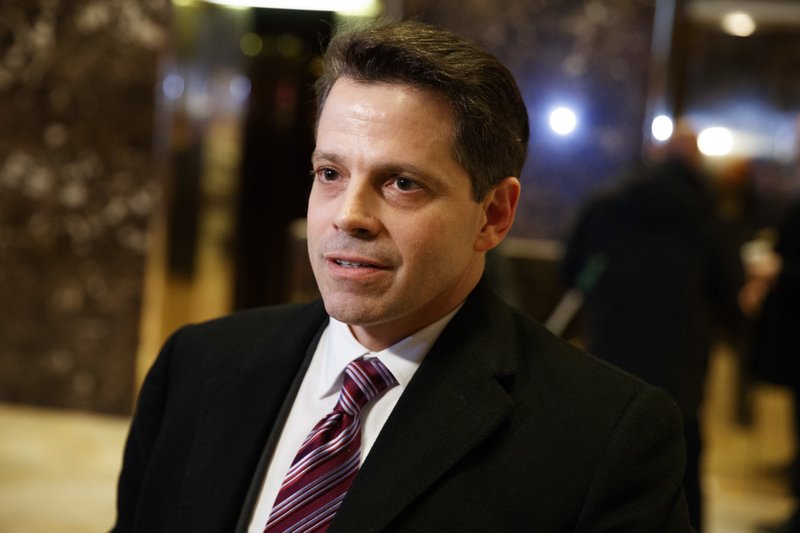
Anthony Scaramucci announced to the world in January that he would be leaving Wall Street for the White House to become President Donald Trump‘s top public liaison. Not long after, Scaramucci was told by Trump’s chief of staff that the sale of his hedge fund — a deal that includes a well-known Chinese conglomerate — raised too many ethics issues for him to start work immediately. Scaramucci never left New York. It’s a different story for Gary Cohn. The former Goldman Sachs executive, the man who is now Trump’s economic adviser reported for duty on Day One and has become a constant White House presence, often at the president’s side. All the while, Cohn has held a multimillion-dollar stake in a Chinese bank, which he’s now selling. White House officials say Scaramucci’s transaction is far more complex than Cohn’s holdings, arguing that’s why it gave them pause. But others point to the two cases as an example of Trump’s uneven approach to handling ethics concerns. The White House on Wednesday acknowledged it did not secure an ethics pledge from ousted national security adviser Michael Flynn, who served for two weeks after Trump signed an executive order mandating that officials agree to a five-year lobbying ban and lifetime prohibition on foreign lobbying. White House officials offered no explanation for why Flynn didn’t sign the documents. “At least so far, the ethical standards that are being applied to high-level officials coming in are quite incoherent and seemingly haphazard,” said Meredith McGehee, a chief at the government reform group Issue One who has worked on federal ethics laws and policies for decades. With so many well-off business executives coming into the administration, the Trump team could minimize conflict-of-interest questions by being more consistent and transparent, she said. “Instead, they seem like they are leading with their chin,” she added. White House spokesman Sean Spicer said the Trump team “has been very committed to making sure that we institute high standards here and that we’re held to them.” Business intersections with China are particularly nettlesome, given many Chinese companies’ ties to the country’s Communist Party. Adding another layer of complexity is Trump’s frequent vow to take a tougher stance on China’s trade and currency practices, which could affect Chinese companies’ ability to sell their goods and services in the U.S. But while Scaramucci raised red flags in the White House, others — including Trump’s son-in-law and the president himself — have Chinese business ties that do not seem to have drawn as much internal hand-wringing. Cohn is in the process of selling his stock in the Industrial and Commercial Bank of China as he works with the Office of Government Ethics to clear out potential conflicts of interest, according to a White House official who requested anonymity to discuss the personnel matter. The New York Times reported last week that Cohn’s ICBC stock was the largest in his portfolio, valued at about $16 million. White House officials originally said that the ethics office flagged Scaramucci’s deal to sell his stake in SkyBridge Capital to a buyer group that included a subsidiary of Chinese conglomerate HNA Group as the reason he shouldn’t start government work right away. However, the office issued a statement to Bloomberg News saying it “had no involvement whatsoever” in the decision not to let Scaramucci start work. Trump’s family has its own business ties to China. Like Trump, Kushner — who is a senior adviser to the president — followed his father into New York real estate. The 36-year-old sold numerous assets to a family trust and said he has completely stepped away from his businesses and is following all conflicts of interest rules. Kushner Companies, now led by his relatives, has been negotiating with the Chinese Anbang Insurance Group to provide what could be hundreds of millions of dollars in equity for redevelopment of a Manhattan office building. “Kushner Companies is in advanced, ongoing discussions around 666 5th Avenue,” a company spokesman said, declining to discuss Anbang specifically. A person with direct knowledge of the talks confirmed the Anbang negotiations to The Associated Press, although the person requested anonymity to discuss the private deal. Jared Kushner sold his stake in that building to the trust as part of his agreement with the Office of Government Ethics, but his family stands to benefit from the deal. A senior White House official who requested anonymity to discuss a personnel matter said Kushner would recuse himself from any government business to which Anbang Insurance Group is a party. Yet Kushner took a more cautious approach on a business issue that didn’t involve China. When news surfaced last month that Miami Marlins owner Jeffrey Loria was considering selling the baseball team to the Kushner family and was on deck to become Trump’s ambassador to France, the Kushners called off the deal entirely. The Kushners said in a statement at the time that they were pulling the plug on the potential deal because “we do not want this unrelated transaction to complicate” Loria’s potential ambassadorship. The senior White House official said that although Jared Kushner had nothing to do with the Marlins negotiation his family wanted to avoid even the appearance of impropriety. The president himself hasn’t drawn a bright line when it comes to ethics. Although he handed daily management of his businesses to his two adult sons and a senior Trump Organization official, he placed his assets in a revocable trust that he can take control of at any time. And while the Trump Organization pledged not to enter new foreign deals, it hasn’t stopped selling its domestic properties to foreign buyers. New York City real estate transaction records show that last month a Chinese businesswoman paid almost $16 million for a condominium in one of Trump’s properties. Meanwhile, the sale of Scaramucci’s hedge fund is expected to go through this spring. He declined to comment on his plan, but he’s said publicly that he expects to eventually join the White House.


